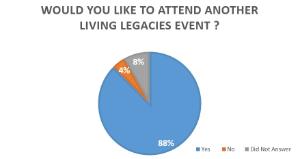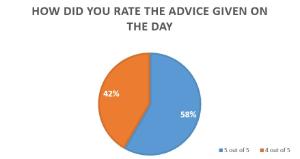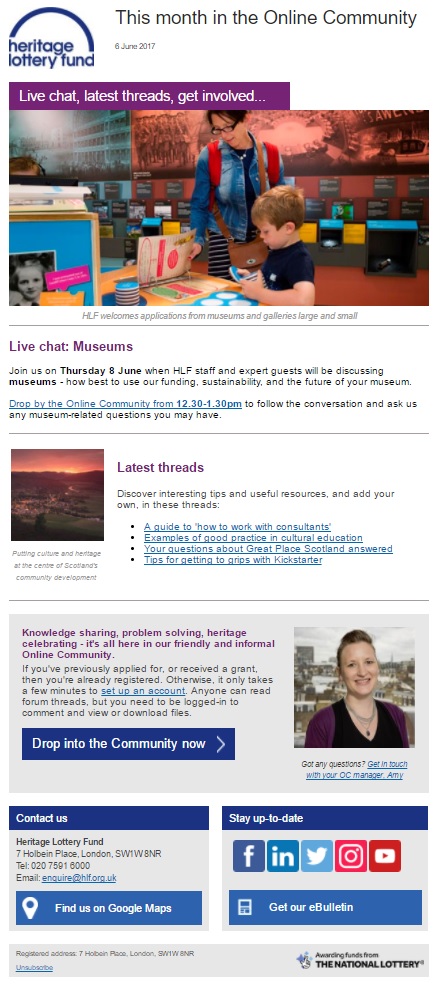June 2017
War Memorials Trust 20th Anniversary
The War Memorials Trust celebrated their 20th Anniversary in style at the House of Lords las month. The event was hosted by the Trust’s Chariman – Peter Cormick OBE. Since establishing itself as a small charity, the War Memorial Trust has come a long way. They have provided numerous grants to support the restoration of memorials across the United Kingdom, and have a searchable database showcasing this work to view this, click here.
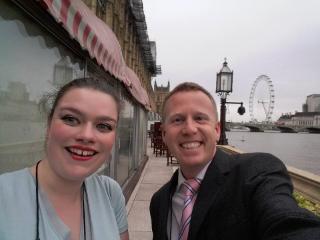
It was a very interesting event, and I learnt a lot about the work done by volunteers from across the country to protect and preserve the thousands of memorials we have dedicated to those who lost their lives serving their King (or Queen) and Country. Peter McCormick shared some entertaining anecdotes from the Trust’s early days and highlighted the fantastic work that the Trust has done in its two decades. Director Frances Moreton then read out a message of support from the War Memorials Trust’s patron, HRH The Duchess of Cornwall.
Although the War Memorials Trust has many volunteers in England, they are always keen to recruit more, and are looking specially to increase their presence in Wales and Northern Ireland. If you are interested in applying for a grant to restore a memorial in your local area, they have a War Memorials Officer for many local authorities, who should be your first point of contact. Click here for more information. The Trust recently launched a website (war memorials online) to “record, conserve and remember our war memorials.” So far, contributors have uploaded the details of 30,000 memorials and submitted 20,000 condition reports.
On the 22nd and 23rd of June, the War Memorials Trust will be running two Memorials Online Workshops in collaboration with the Powys War Memorials Project. These workshops aim to provide training on the use of the War Memorials Online website; a site visit to survey the condition of a local memorial and guidance on best conservation practise in addition to providing guidance on the funding available for war memorials and information about the Powys War Memorial Project. The War Memorial Trust are very pleased with the amount of people who have booked a place on this workshop and are keen to hold more events like this with other local community groups.
Picture top left: Meg Ryder of Living Legacies with Nathan Davies of Powys War Memorials on the House of Lords’ Balcony.
Sharing Community Research during the Centenary of WW1
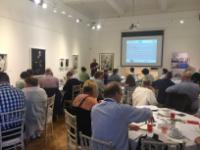 On Monday 19th June, Living Legacies played host to a number of researchers, academics and funding bodies who shared their knowledge and experience in commemorating the centenary of WW1 and its heritage in Northern Ireland.
On Monday 19th June, Living Legacies played host to a number of researchers, academics and funding bodies who shared their knowledge and experience in commemorating the centenary of WW1 and its heritage in Northern Ireland.
Held at the Ulster Museum, Belfast, the event celebrated the wide variety of projects that have engaged communities in exploring the legacy of WW1. The event also connected community researchers with academics to develop closer collaborations on WW1 heritage and explained how the Heritage Lottery Fund (HLF) can support future projects which explore the military, cultural and societal impacts of the war upon the lives of people and communities.
Throughout the day, participants heard from groups who have successfully completed HLF-funded projects. Staff from Living Legacies were also on hand to provide expert advice to community groups who have ideas for their own WW1 Centenary projects and advisors from HLF talked through some of the practical aspects of applying for funding.
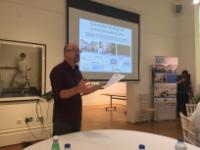 The day began with an introductory presentation by Keith Lilley from Living Legacies who explained how the WW1 Engagement Centres throughout the United Kingdom can help support local community groups in planning and resourcing their project ideas. Please click here to view presentation given on the day. This was followed by three presentations which described some of the successfully funded projects which took place in Northern Ireland.
The day began with an introductory presentation by Keith Lilley from Living Legacies who explained how the WW1 Engagement Centres throughout the United Kingdom can help support local community groups in planning and resourcing their project ideas. Please click here to view presentation given on the day. This was followed by three presentations which described some of the successfully funded projects which took place in Northern Ireland.
3D Technologies
A stunning 3D model of the event was taken, using the latest technologies being pioneered by Peter McCready please see the links and videos below to explore this virtual world.
|
Video Intro for Event in the Belfast Room NMNI |
|
Video Intro for Event Project Displys in the Belfast Room NMNI |
| Click here for full Link to 3D Model |
'Matterport 3D photography by Peter McCready' p.mccready@qub.ac.uk
Project Presentations
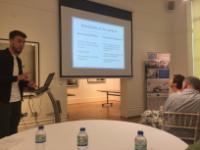 In the first presentation, Jason Burke from the ‘East Belfast & the Great War Research Project’ explained how he aimed to broaden community engagement with, and understanding of, First World War heritage in East Belfast. He described how, through a series of ‘Information gathering sessions’ at churches and community centres, members of the public shared their artefacts and family histories with historians and he explained how HLF funding made it possible to compile a database of details of every single serviceman from East Belfast who served in the Great War.
In the first presentation, Jason Burke from the ‘East Belfast & the Great War Research Project’ explained how he aimed to broaden community engagement with, and understanding of, First World War heritage in East Belfast. He described how, through a series of ‘Information gathering sessions’ at churches and community centres, members of the public shared their artefacts and family histories with historians and he explained how HLF funding made it possible to compile a database of details of every single serviceman from East Belfast who served in the Great War.
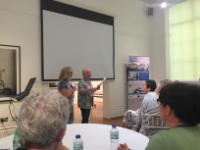 Next, representatives from the Cleenish Community Group described how their project investigated a Government scheme called ‘Homes Fit for Heroes’ which was designed to help returning troops to settle back into civilian life. They explained how funding from HLF allowed them to explore the story of how and why a group of ex-soldiers, returning from the Front came to be rehoused on an island on Fermanagh, with no utilities and no bridge to the mainland. The group explained how their project documented the experience of these residents by tracing descendants of the veterans and, in doing so, made an important contribution to a forgotten history in their own community.
Next, representatives from the Cleenish Community Group described how their project investigated a Government scheme called ‘Homes Fit for Heroes’ which was designed to help returning troops to settle back into civilian life. They explained how funding from HLF allowed them to explore the story of how and why a group of ex-soldiers, returning from the Front came to be rehoused on an island on Fermanagh, with no utilities and no bridge to the mainland. The group explained how their project documented the experience of these residents by tracing descendants of the veterans and, in doing so, made an important contribution to a forgotten history in their own community.
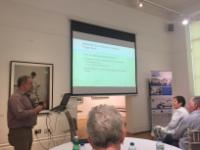 Lastly, Kurt Taroff from Queen’s University presented the ‘Medals All ‘Round Research Initiative’ (MARRI), a community drama based project which engaged a wide variety of groups throughout Northern Ireland in an investigation of local stories and connections to WW1. The project engaged with groups from localities defined as areas of social need and involved communities which reflected a broad range of diversity, including Protestant and Catholic communities, a Special Needs group as well as Prisoners/Ex-Offenders. MARRI, which worked with the Creative Learning Department at the Lyric Theatre, Belfast involved over 100 participants. The project employed a number of drama facilitators to work with community groups in writing and performing their own plays and culminated in a showcase of performance work at the Lyric Theatre. As an interactive method of engagement with historical memory, Kurt explained that MARRI presented how drama and theatre methods can challenge the contested histories in Northern Ireland’s commemorations of the centenary of the First World War. . Please click here to view presentation given on the day.
Lastly, Kurt Taroff from Queen’s University presented the ‘Medals All ‘Round Research Initiative’ (MARRI), a community drama based project which engaged a wide variety of groups throughout Northern Ireland in an investigation of local stories and connections to WW1. The project engaged with groups from localities defined as areas of social need and involved communities which reflected a broad range of diversity, including Protestant and Catholic communities, a Special Needs group as well as Prisoners/Ex-Offenders. MARRI, which worked with the Creative Learning Department at the Lyric Theatre, Belfast involved over 100 participants. The project employed a number of drama facilitators to work with community groups in writing and performing their own plays and culminated in a showcase of performance work at the Lyric Theatre. As an interactive method of engagement with historical memory, Kurt explained that MARRI presented how drama and theatre methods can challenge the contested histories in Northern Ireland’s commemorations of the centenary of the First World War. . Please click here to view presentation given on the day.
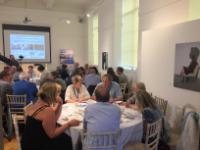 These presentations were followed by the first ‘breakout session’ of the day when participants used the opportunity to reflect on the presented projects. These sessions were built into the day to allow for participants to discuss with eachother not only the projects presented to them but their own projects and ideas. These sessions provided valuable opportunities for people to talk about common interests as well as any issues arising from their own projects. Table discussions were chaired by Living Legacies staff and participants welcomed the chance to ask specific questions and share experiences with other community workers and hear about the wide variety of projects taking place throughout the province at the moment.
These presentations were followed by the first ‘breakout session’ of the day when participants used the opportunity to reflect on the presented projects. These sessions were built into the day to allow for participants to discuss with eachother not only the projects presented to them but their own projects and ideas. These sessions provided valuable opportunities for people to talk about common interests as well as any issues arising from their own projects. Table discussions were chaired by Living Legacies staff and participants welcomed the chance to ask specific questions and share experiences with other community workers and hear about the wide variety of projects taking place throughout the province at the moment.
HLF Presentation
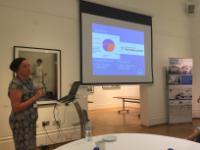 This session was followed by a valuable and informative presentation on the work of the Heritage Lottery Fund by Development Manager at the Northern Ireland branch of HLF, Úna Duffy. Beginning with an overview of the work that the HLF supports, Una described the different funding programmes available to community groups and explained how each programme works to support a wide number of projects be they small or large scale. In her presentation, Úna gave very clear guidance on the type of projects that HLF will – and will not - support. She also outlined the common pitfalls that many groups make when submitting applications for funding for their projects. Overall, the presentation was a positive affirmation of the variety of projects that are happening in Northern Ireland at the moment. It demonstrated the huge variety of heritage work going on in Northern Ireland at the moment and proved to be very encouraging for those who were presently in the planning stages of their own community projects. Please click here to view presentation given on the day.
This session was followed by a valuable and informative presentation on the work of the Heritage Lottery Fund by Development Manager at the Northern Ireland branch of HLF, Úna Duffy. Beginning with an overview of the work that the HLF supports, Una described the different funding programmes available to community groups and explained how each programme works to support a wide number of projects be they small or large scale. In her presentation, Úna gave very clear guidance on the type of projects that HLF will – and will not - support. She also outlined the common pitfalls that many groups make when submitting applications for funding for their projects. Overall, the presentation was a positive affirmation of the variety of projects that are happening in Northern Ireland at the moment. It demonstrated the huge variety of heritage work going on in Northern Ireland at the moment and proved to be very encouraging for those who were presently in the planning stages of their own community projects. Please click here to view presentation given on the day.
After lunch there was an opportunity for feedback on the breakout discussion session earlier in the morning. Each table, through an appointed spokesperson, gave a brief summary of the subjects they discussed and participants offered comments on the positive experiences that they had in running their respective projects.
Themed Presentations
The participants heard from representatives from each of the three themed strands of research currently being carried out at Living Legacies. In a segment entitled, ‘Developing WW1 Centenary Projects through Collaboration’, participants were given a summary of each research theme by the Principal Investigators. These presentations also explained how community groups, interested in running their own projects could avail of expert help and guidance from Living Legacies researchers. First, Paul Ell and Elaine Reid spoke about the Digital Heritage and Engagement theme. In parnership with Centre for Data Digitisation and Analysis they explanied how the team could support community led projects by offering bespoke workshops in key areas of digital engagement including the development of skills in object digitisation and website development. Please click here to view presentation given on the day.
Secondly, Keith Lilley and Heather Montgomery spoke about their theme Material Cultures and Landscapes. Please click here to view presentation given on the day.
Thirdly, Johanne Devlin-Trew presented the Critical Commemoration theme and its focus on how the legacy of conflict can be commemorated within the community. Please click here to view presentation given on the day.
Interactive Performance
Using the successful MARRI project as an example of how community groups have used drama techniques to present local or hidden stories from the past, the presentation demonstrated the wide variety of support available to community groups who want to explore the past by using creative methods.
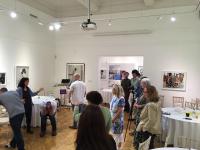
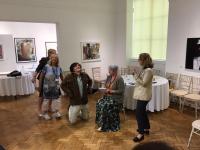 The last session of the day explored the potential of creative response to the past through an interactive drama workshop facilitated by Michelle Young. The workshop demonstrated some of the drama techniques that can be used to introduce people to the history of WW1 and how specific theatre methods can allow for an exploration into some of the personal stories of those involved. The workshop began with a short performance by local actors, Chris Grant and Gary Crossan who performed excerpts from the play, Medal in the Drawer by Brenda Winter-Palmer.
The last session of the day explored the potential of creative response to the past through an interactive drama workshop facilitated by Michelle Young. The workshop demonstrated some of the drama techniques that can be used to introduce people to the history of WW1 and how specific theatre methods can allow for an exploration into some of the personal stories of those involved. The workshop began with a short performance by local actors, Chris Grant and Gary Crossan who performed excerpts from the play, Medal in the Drawer by Brenda Winter-Palmer. 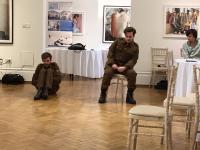 Participants, who were then split into small groups, were asked to develop a series of three scenes of events from a soldier’s life which they presented to eachother in freezeframe. These scenes were then developed through the addition of an improvised ‘script’ where key characters voiced their thoughts within the moment of the scene. All of the groups presented their work to eachother at the end of the workshop which prompted discussion around interpretations of the past and how these can contribute to our understanding of the legacy of WW1.
Participants, who were then split into small groups, were asked to develop a series of three scenes of events from a soldier’s life which they presented to eachother in freezeframe. These scenes were then developed through the addition of an improvised ‘script’ where key characters voiced their thoughts within the moment of the scene. All of the groups presented their work to eachother at the end of the workshop which prompted discussion around interpretations of the past and how these can contribute to our understanding of the legacy of WW1.
The day ended
The day ended with a summary of all the presentations with a focus on the variety of ways that community projects can explore the legacy of the past and the range of support available to assist those thinking of running their own project. In a day which celebrated the breadth of commemorative work being carried out in local communities, this event provided a vital forum for all community researchers, the heritage of WW1 and its continuing impact on our lives today. Please click graphs below to view in full.
